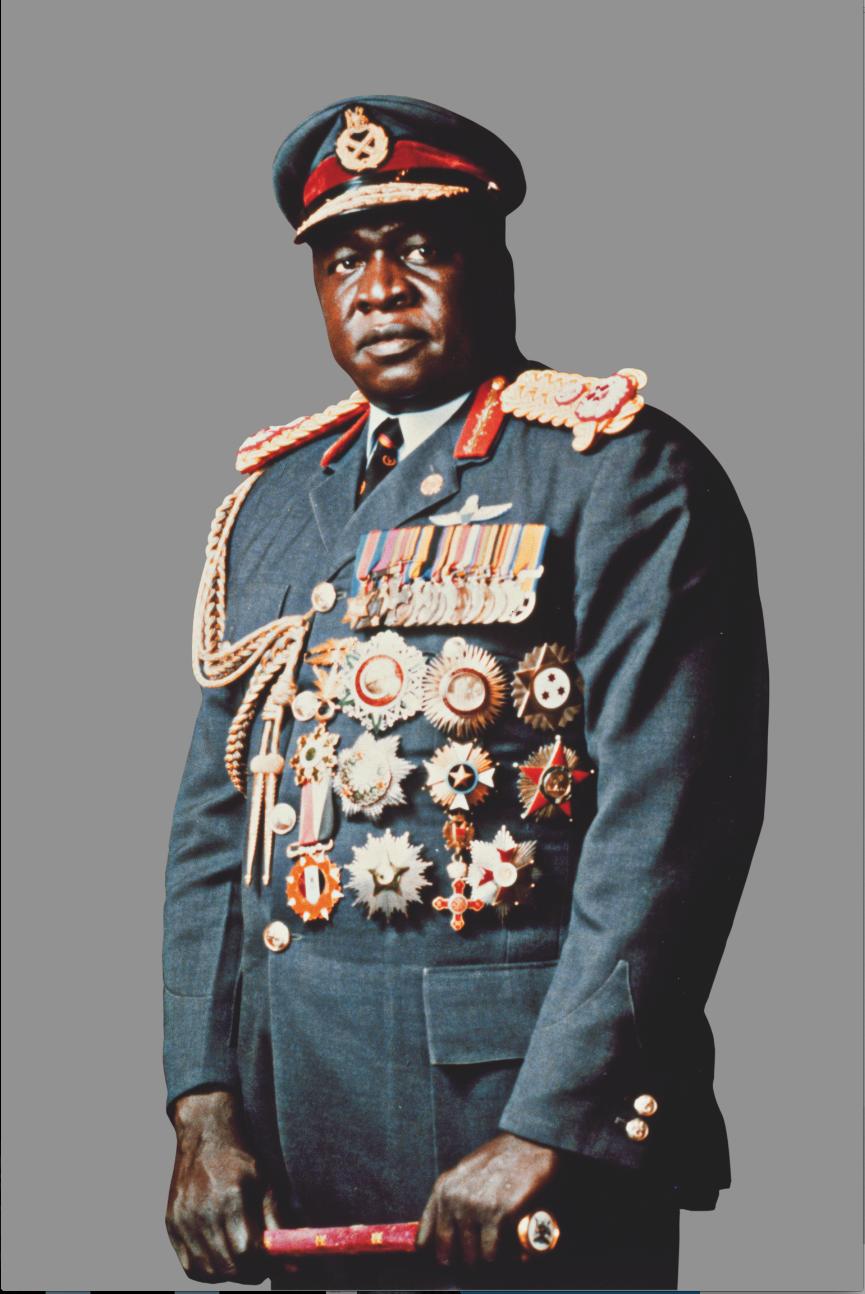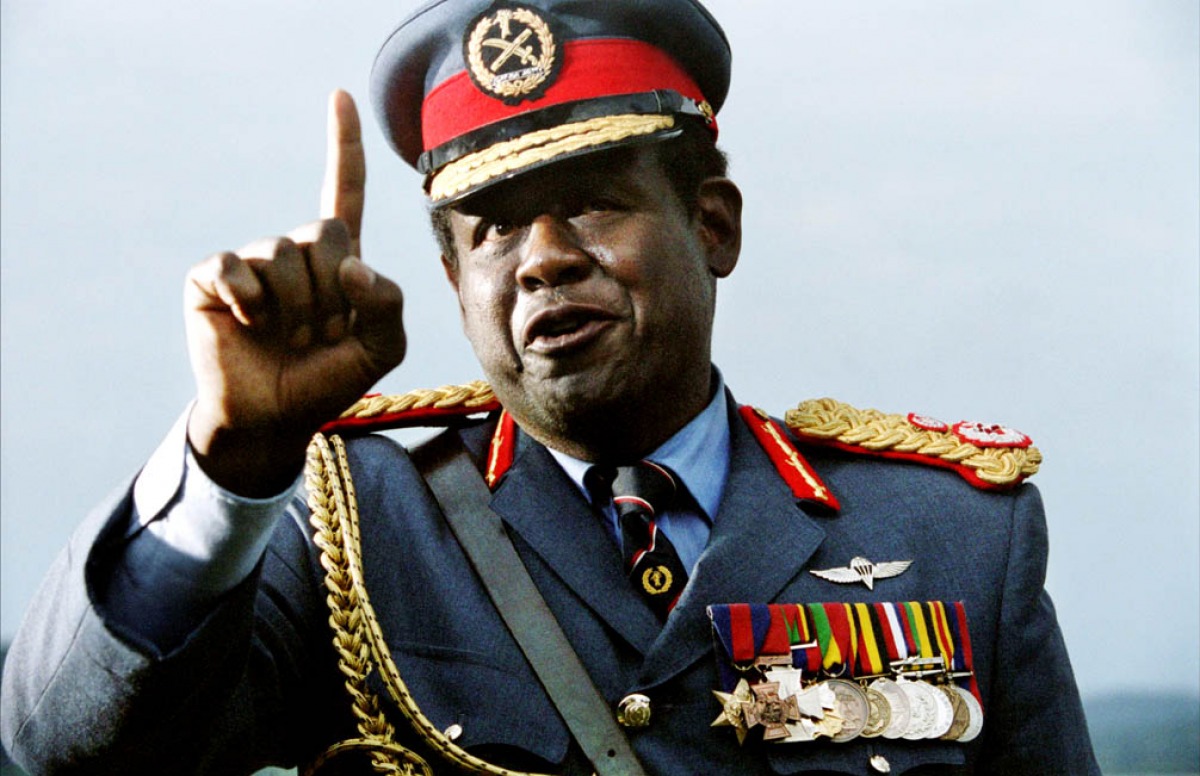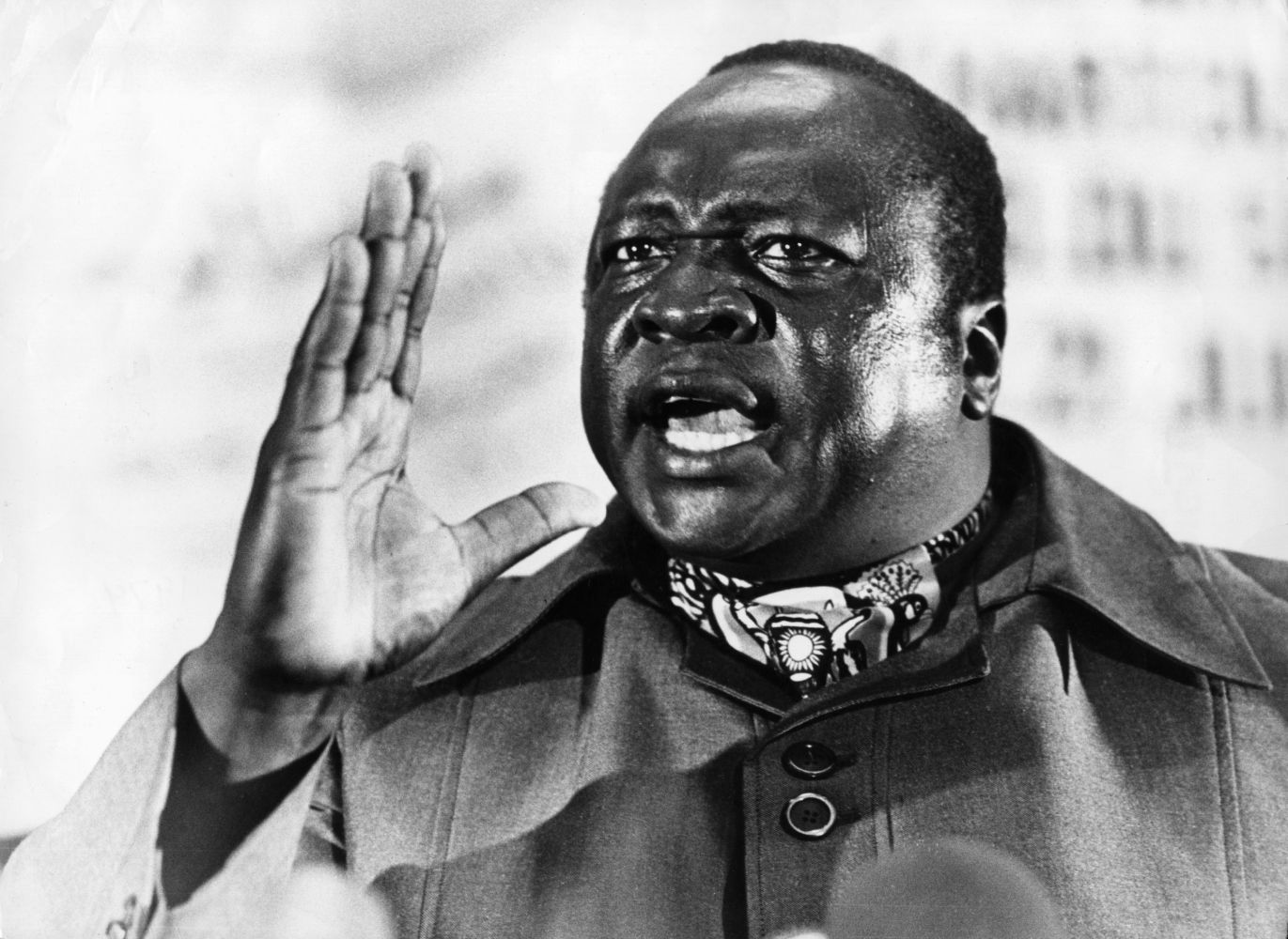Idi Amin Khadija Abria Amin was the third President of Uganda, who reigned from 1971 to 1979. He was a military officer who seized power in a military coup and established a brutal dictatorship known as the "Reign of Terror".
Amin's rule was characterized by human rights abuses, economic decline, and political instability. He was overthrown in a military invasion by Tanzania in 1979 and fled into exile in Saudi Arabia, where he lived until his death in 2003.
The Idi Amin Khadija Abria Amin regime is a tragic reminder of the dangers of military dictatorship and the importance of human rights and democracy.
- Odia Mms Video Unveiling The Truth Behind The Controversy
- Discover The World Of Xxx Small Girl A Comprehensive Guide
Idi Amin Khadija Abria Amin
Idi Amin Khadija Abria Amin's rule in Uganda was marked by human rights abuses, political instability, and economic decline. Key aspects of his regime include:
- Dictatorship
- Military rule
- Human rights abuses
- Economic decline
- Political instability
- Reign of Terror
- Military coup
- Overthrow
- Exile
Amin's regime was a brutal dictatorship that resulted in the deaths of hundreds of thousands of Ugandans. His economic policies led to a decline in living standards, and his political instability created a climate of fear and uncertainty. Amin was eventually overthrown in a military invasion by Tanzania and fled into exile in Saudi Arabia.
Personal details and bio data
| Name | Birth | Death | Nationality | Occupation |
|---|---|---|---|---|
| Idi Amin Khadija Abria Amin | 1925 | 2003 | Ugandan | Military officer, dictator |
Dictatorship
A dictatorship is a form of government in which one person or a small group of people holds absolute power. Dictatorships are often characterized by the suppression of political opposition, the use of violence and intimidation, and the control of the media and the economy.
- Layla Deline Rising Star In The Adult Entertainment Industry
- Baldwin Brothers Exploring The Legacy Of Hollywoods Most Talented Siblings
Idi Amin Khadija Abria Amin was a dictator who ruled Uganda from 1971 to 1979. His regime was one of the most brutal in African history. Amin was responsible for the deaths of hundreds of thousands of Ugandans, and his economic policies led to a decline in living standards.
The dictatorship of Idi Amin Khadija Abria Amin is a reminder of the dangers of unchecked power. Dictatorships are often able to maintain their power by using violence and intimidation to suppress opposition. However, dictatorships are ultimately unsustainable, as they rely on the support of a small group of people. When the people rise up against a dictatorship, it is often overthrown.
Military rule
Military rule is a form of government in which the military holds political power. This can happen through a military coup, in which the military overthrows the existing government, or through a gradual process in which the military gains more and more control over the government.
Idi Amin Khadija Abria Amin came to power in Uganda through a military coup in 1971. He established a military dictatorship that lasted for eight years. During this time, the military was responsible for widespread human rights abuses, including torture, arbitrary detention, and extrajudicial killings. The military also played a key role in the economic decline of Uganda during Amin's rule.
Military rule is often seen as a necessary evil in times of crisis. However, it is important to remember that military rule is a form of dictatorship and that it can lead to the suppression of human rights and the erosion of democracy.
Human rights abuses
Human rights abuses were a central component of Idi Amin Khadija Abria Amin's regime in Uganda. Amin's government was responsible for the deaths of hundreds of thousands of Ugandans, and his security forces routinely engaged in torture, arbitrary detention, and extrajudicial killings.
The human rights abuses committed by Idi Amin Khadija Abria Amin were motivated by a number of factors, including his desire to maintain power, his hatred of certain ethnic groups, and his paranoia. Amin's regime was also characterized by a culture of impunity, which allowed security forces to commit human rights abuses without fear of punishment.
The human rights abuses committed by Idi Amin Khadija Abria Amin had a devastating impact on Uganda. The country's economy was destroyed, its social fabric was torn apart, and its people were traumatized. The legacy of Amin's regime continues to haunt Uganda today.
Economic decline
Economic decline was a central feature of Idi Amin Khadija Abria Amin's regime in Uganda. Amin's economic policies were disastrous, leading to a collapse in the country's economy and a sharp decline in living standards.
- Collapse of agriculture
Amin's policies led to a collapse in agricultural production. He expelled the country's Asian population, who were key players in the agricultural sector. He also collectivized agriculture, which resulted in a sharp decline in productivity.
- Decline in industry
Amin's nationalization of industry led to a decline in production and investment. The government was unable to manage the businesses it had taken over, and many of them simply collapsed.
- Hyperinflation
Amin's government printed money to finance its spending, which led to hyperinflation. Prices rose rapidly, making it difficult for people to afford basic necessities.
- Collapse of infrastructure
Amin's government neglected infrastructure, which led to its collapse. Roads, bridges, and schools fell into disrepair. The country's transportation and communication systems were severely disrupted.
The economic decline under Idi Amin Khadija Abria Amin had a devastating impact on Uganda. The country's economy was destroyed, its people were impoverished, and its social fabric was torn apart. The legacy of Amin's economic policies continues to haunt Uganda today.
Political instability
Political instability is a state of political turmoil and uncertainty. It can be caused by a variety of factors, including economic decline, social unrest, and ethnic conflict. Political instability can lead to a breakdown in law and order, and can make it difficult for a government to function effectively.
Idi Amin Khadija Abria Amin's regime in Uganda was characterized by political instability. Amin came to power in a military coup in 1971, and his rule was marked by violence, corruption, and economic decline. Amin's government was unable to maintain law and order, and the country descended into chaos.
The political instability in Uganda under Idi Amin Khadija Abria Amin had a number of negative consequences. The economy was destroyed, the social fabric was torn apart, and human rights were violated on a massive scale. Amin's regime is a reminder of the dangers of political instability, and the importance of strong and stable institutions.
Reign of Terror
The "Reign of Terror" is a term used to describe a period of intense violence and political oppression. It is often used to refer to the period of the French Revolution from 1793 to 1794, during which thousands of people were executed. However, the term can also be used to describe other periods of political violence, such as the "Great Purge" in the Soviet Union under Joseph Stalin.
Idi Amin Khadija Abria Amin's regime in Uganda from 1971 to 1979 is often referred to as a "Reign of Terror". During this time, Amin's security forces carried out a campaign of violence and intimidation against the Ugandan people. Thousands of people were killed, and many more were tortured or imprisoned.
The "Reign of Terror" under Idi Amin Khadija Abria Amin was caused by a number of factors, including Amin's desire to maintain power, his hatred of certain ethnic groups, and his paranoia. The violence and intimidation were used to suppress opposition to Amin's regime and to create a climate of fear and uncertainty.
The "Reign of Terror" under Idi Amin Khadija Abria Amin had a devastating impact on Uganda. The country's economy was destroyed, its social fabric was torn apart, and its people were traumatized. The legacy of Amin's regime continues to haunt Uganda today.
Military coup
A military coup is a sudden and illegal seizure of power from a government by the military. Military coups are often motivated by a desire to change the government's policies or to remove a leader from power.
Idi Amin Khadija Abria Amin came to power in Uganda through a military coup in 1971. Amin was a military officer who had been trained by the British. He seized power from the civilian government of Milton Obote. Amin's coup was supported by a number of other military officers, and he quickly established a military dictatorship.
Military coups are often seen as a necessary evil in times of crisis. However, it is important to remember that military coups are a form of dictatorship and that they can lead to the suppression of human rights and the erosion of democracy.
The military coup that brought Idi Amin Khadija Abria Amin to power in Uganda is a reminder of the dangers of military rule. Amin's regime was one of the most brutal in African history. Amin was responsible for the deaths of hundreds of thousands of Ugandans, and his economic policies led to a decline in living standards.
Overthrow
Overthrow, in a political context, refers to the act of removing a government from power, typically through violent or non-violent means. Idi Amin Khadija Abria Amin's regime in Uganda was overthrown in 1979 by a Tanzanian invasion force with the support of Ugandan exiles.
The overthrow of Idi Amin Khadija Abria Amin was a direct result of his brutal and oppressive dictatorship. Amin had come to power in a military coup in 1971, and his regime was characterized by human rights abuses, economic decline, and political instability. Amin's overthrow was a major turning point in Ugandan history, and it marked the end of one of the most brutal dictatorships in Africa.
The overthrow of Idi Amin Khadija Abria Amin is a reminder of the importance of human rights and democracy. Amin's regime was a brutal dictatorship that resulted in the deaths of hundreds of thousands of Ugandans. His overthrow was a victory for the Ugandan people, and it is a reminder that no dictator is invincible.
Exile
Exile is the forced removal of a person or group of people from their homeland. It can be a temporary or permanent measure, and it can be imposed by a government, a military force, or another group. Exile has been used throughout history as a way to punish political dissidents, religious minorities, and other groups that are seen as a threat to the ruling power.
Idi Amin Khadija Abria Amin, the former dictator of Uganda, was exiled from his country in 1979 after he was overthrown by a Tanzanian invasion force. Amin fled to Saudi Arabia, where he lived in exile until his death in 2003.
Exile was a critical component of Amin's downfall. It prevented him from returning to Uganda and regaining power. It also served as a symbol of his defeat and the end of his brutal dictatorship.
The practical applications of understanding the connection between exile and Idi Amin Khadija Abria Amin are numerous. First, it helps us to understand the importance of exile as a tool for removing dictators from power. Second, it provides insights into the challenges that exiled dictators face in regaining power. Finally, it helps us to understand the broader theme of exile as a form of punishment and oppression.
This article has explored the life and legacy of Idi Amin Khadija Abria Amin, the former dictator of Uganda. Amin's regime was one of the most brutal in African history, characterized by human rights abuses, economic decline, and political instability. He was overthrown in 1979 and lived in exile in Saudi Arabia until his death in 2003.
The article has highlighted several key points about Amin's regime. First, it shows the dangers of dictatorship and the importance of human rights and democracy. Second, it demonstrates the power of exile as a tool for removing dictators from power. Third, it provides insights into the challenges that exiled dictators face in regaining power.
The legacy of Idi Amin Khadija Abria Amin is a complex one. He was a brutal dictator who caused great suffering to the Ugandan people. However, his overthrow was a victory for human rights and democracy. Amin's story is a reminder of the importance of fighting against tyranny and oppression.
- Lyra Crow Leaks Unveiling The Truth Behind The Controversy
- Daniel Sunjata A Journey Through Acting And Activism


